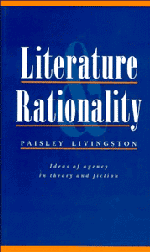6 - Science, reason, and society
from II - TEXTUAL MODELS
Published online by Cambridge University Press: 16 October 2009
Summary
In the last three chapters I have explored some ways in which readings of literary narratives can help us to clarify, challenge, and improve concepts of rationality emerging within a range of disciplines, including philosophy, the social sciences, and psychology. Various narratives, I have argued, usefully illustrate the short-comings of reductionist models of agency and atomistic conceptions of rationality, and in each case I have stressed the relevance and value of an agential perspective on rationality. Yet it may be objected here that although these hypothetical revisions of atomistic concepts of rationality are a step in the right direction, they still do not go far enough. At the heart of the agential conception of rationality – or so the objection would run – is an essentially ‘individualist’ prejudice, the result being a failure to account for supra-individual social realities: if we grant that individual beliefs, desires, intentions, and actions should be evaluated in the larger context of the agent's long-term reasons and interests, we should conclude as well that the latter should be viewed in a larger framework, namely, the interpersonal and social context where they are situated. Otherwise, we would be forced to allow that an agent and her actions could be rational even when they contribute to an essentially irrational social action or situation.
This is a difficult and important issue. In keeping with the approach adopted in the rest of this study, I shall address myself to this problem by seeking connexions between theoretical and narrative sources.
- Type
- Chapter
- Information
- Literature and RationalityIdeas of Agency in Theory and Fiction, pp. 179 - 204Publisher: Cambridge University PressPrint publication year: 1991



